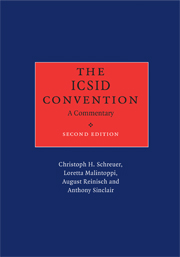Book contents
- Frontmatter
- Contents
- Foreword by Professor Sir Elihu Lauterpacht, CBE, QC
- Authors' preface to the second edition
- Table of cases
- List of abbreviations
- Text of the ICSID Convention
- Procedural calendar
- PREAMBLE
- CHAPTER I International Centre for Settlement of Investment Disputes
- CHAPTER II Jurisdiction of the Centre
- CHAPTER III Conciliation
- CHAPTER IV Arbitration
- CHAPTER V Replacement and Disqualification of Conciliators and Arbitrators
- CHAPTER VI Cost of Proceedings
- CHAPTER VII Place of Proceedings
- CHAPTER VIII Disputes between Contracting States
- CHAPTER IX Amendment
- Article 65 Proposal to Amend Convention
- Article 66 Decision on Amendment
- CHAPTER X Final Provisions
- Final Clause
- Consolidated bibliography
- Index by article
- Index by subject
Article 66 - Decision on Amendment
from CHAPTER IX - Amendment
Published online by Cambridge University Press: 07 September 2010
- Frontmatter
- Contents
- Foreword by Professor Sir Elihu Lauterpacht, CBE, QC
- Authors' preface to the second edition
- Table of cases
- List of abbreviations
- Text of the ICSID Convention
- Procedural calendar
- PREAMBLE
- CHAPTER I International Centre for Settlement of Investment Disputes
- CHAPTER II Jurisdiction of the Centre
- CHAPTER III Conciliation
- CHAPTER IV Arbitration
- CHAPTER V Replacement and Disqualification of Conciliators and Arbitrators
- CHAPTER VI Cost of Proceedings
- CHAPTER VII Place of Proceedings
- CHAPTER VIII Disputes between Contracting States
- CHAPTER IX Amendment
- Article 65 Proposal to Amend Convention
- Article 66 Decision on Amendment
- CHAPTER X Final Provisions
- Final Clause
- Consolidated bibliography
- Index by article
- Index by subject
Summary
Adoption of Amendments
The legislative history of Art. 66 shows considerable debate. The Preliminary Draft provided for a final adoption of amendments by a qualified majority of the Administrative Council (History, Vol. I, p. 286). In the ensuing debate, several delegates opposed amendments by majority decision since this would create insuperable constitutional problems in their respective countries. Suggested solutions included a right of States to withdraw from the Convention if an amendment seemed unacceptable to them or the application of amendments only to States that had accepted them (History, Vol. II, pp. 282, 288, 357/8, 441/2, 534/5, 579, 652, 671).
The Subsequent First Draft required unanimous adoption by the Administrative Council of amendments involving new obligations or fundamental alterations but adoption by majority of all other amendments (History, Vol. I, pp. 286, 288;Vol. II, pp. 660, 682). A Working Group submitted a proposal that required the ratification of any amendment by all States parties to the Convention. This proposal was adopted by a large majority (at pp. 905, 909/10, 940). This point was the subject of extensive debate by the Executive Directors. Some Directors favoured a more flexible approach to amendments but in the end the proposal requiring ratification by all States parties prevailed (at pp. 994–996, 1000–1003).
- Type
- Chapter
- Information
- The ICSID ConventionA Commentary, pp. 1264 - 1266Publisher: Cambridge University PressPrint publication year: 2009



